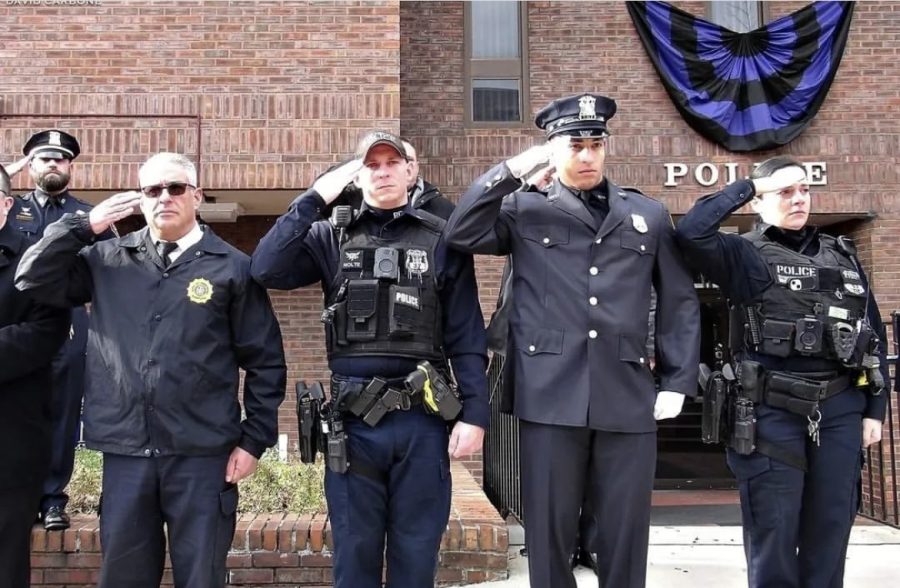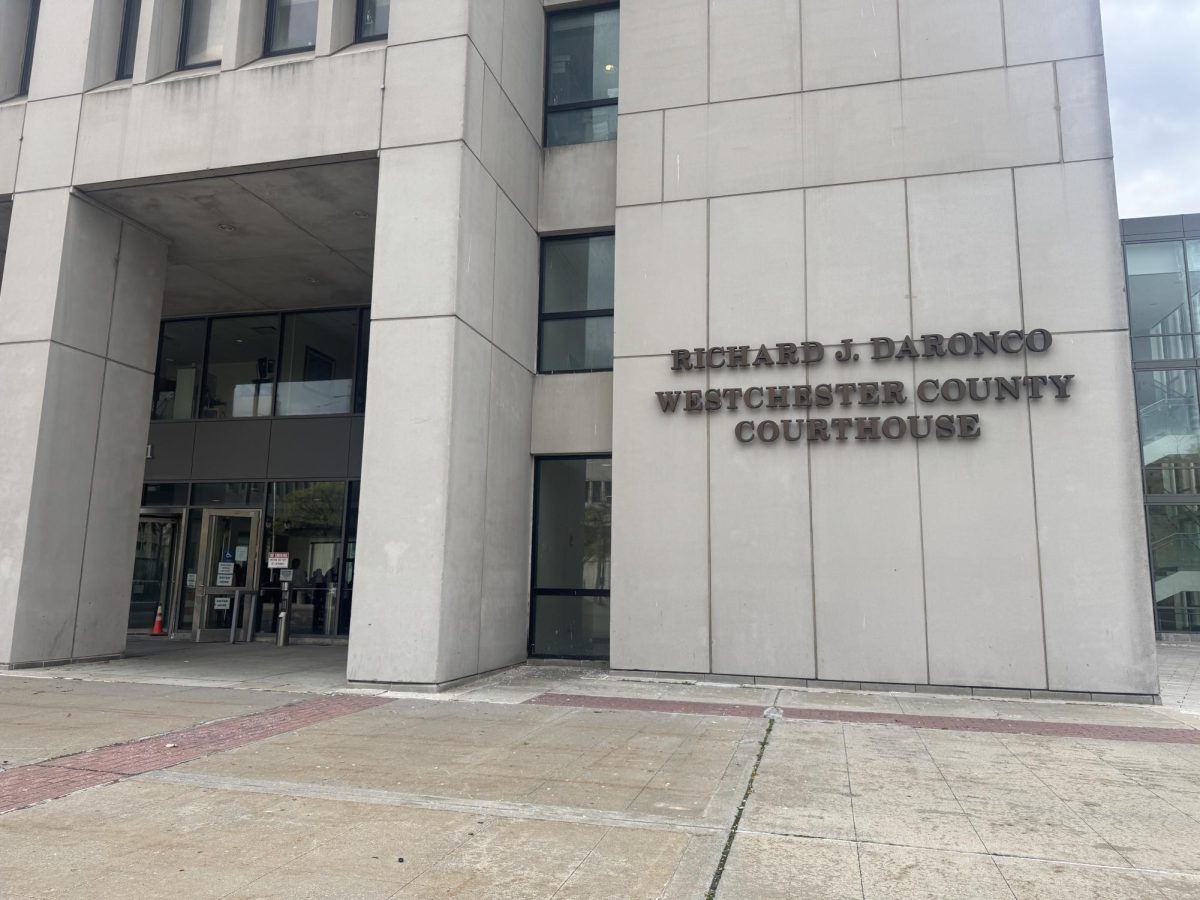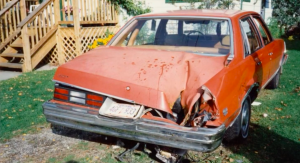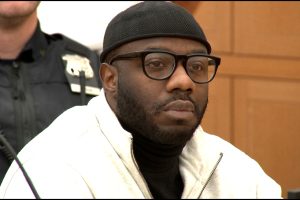Colleagues Offer Support to Grieving Officers
After losing one of their own, Peekskill officers face most difficult assignment: Healing
Peekskill Police Chaplain Robert Lindenberg, left, with officers on the day of Jones’ funeral. Photo from Peekskill Police Department Instagram Page. (peekskillpolice1)
December 9, 2022
The sobering statistic that more police officers die by their own hands than at the hands of offenders became personal last month with the suicide of veteran Peekskill Officer Greg Jones. And while there’s been tremendous advances around the subject of emotional wellness of police officers in the past 20 years, there’s an increased need for awareness from co-workers and family members, said two professionals working with the Peekskill Police Department in the tragedy’s aftermath.
Officer Jones, a 24-year veteran of the force died on November 24th. As a school resource officer, a DARE officer and a member of the community policing unit, he was well known and loved in Peekskill schools and in the larger community.
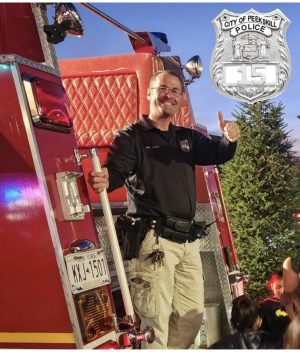
Matthew Frank, co-founder of Westchester B.L.U.E, (Brothers in Law Enforcement Uniting Efforts), came to Peekskill’s American Legion Hall two days after Jones’ death to meet with the fallen officer’s co-workers who were stunned by his death. Frank was joined by members of the Westchester Putnam Peer Support Team and officers of the Peekskill police union. About 30 members of the police department gathered to learn information around Officer Jones’ death and process the devastating news.
“Just the fact that you had that many of the department come out, and that they’re willing to have conversations and willing to support each other with the Westchester Putnam Peer Support team, says a lot,” explained Frank. “They were on a fact finding mission about the details.” There are 37 uniformed patrol officers currently on the Peekskill force in addition to three lieutenants, seven sergeants and five detectives.
“I wish I had the words that make everybody feel better,” said Frank. “The answers don’t exist. We try to find an answer for something that has no answer,” added Frank about a suicide of an officer. He noted that in 2022 there have been 139 deaths of officers nationally due to suicide – nearly as many as the 200 line-of-duty deaths that have occurred as a result of various incidents including traffic accidents, heart attacks, slip and falls, health issues connected to Covid. Statistically, fewer deaths of officers occur due to stabbings and shootings than from suicide.
“These are alarming numbers,” said Frank, noting that there is something about the line of work and the need for management of stress. “The police community has done a tremendous job in realizing the need to be proactive instead of reactive,” around the issue of officer wellness, he added.
While Frank and the Westchester Peer Support Group were meeting with officers at the McKinley Street American Legion Hall, Robert Lindenberg, Peekskill’s Police Chaplain, was at the station with officers who were on duty that day.
“As soon as I got the call, I got in my car and drove to the police station and was present for every roll call,” said Lindenberg, who completed a training last month offered through the Department of Justice on officer wellness with Peekskill police Sgt. Alex DeMundo and Officer Pam Sgroi.
Lindenberg, who is the pastor of The PEAK Community Church, has been trained by the International Conference of Police Chaplains in the specialized area of critical incident and crisis response. At midnight, 8 a.m. and 4 p.m. roll calls for the week after Jones’ death, Lindenberg was present where he did a ‘check up from the neck up’, looking officers in the eye and asking how they’re doing. At those roll calls in the muster room he made resource material available for officers regarding help managing stress and trauma.
As part of his unpaid work with the police department, he offers a ‘ministry of presence’ by going out on ‘ride alongs’ with officers. “People don’t care how much you know until they know how much you care,” said Lindenberg about building relationships with officers during the six years he’s been chaplain to the department.
“In the last 20 years there’s been a lot of information and knowledge about best practices, and departments have gotten real with a lot of the training and certification,” relating to stress management for officers, said Lindenberg. “Now we’re getting smarter; people aren’t afraid to talk about officer resiliency,” said Frank of Westchester B.L.U.E. who explained that the foundation offers emotional support.
“We aren’t therapists, but we have treatment places and specialists we work with and give referrals to officers.” According to Frank, the people who volunteer with Westchester B.L.U.E are former law enforcement officers who have ‘been there and done that’ and understand the challenges officers face. They work with families of officers, extending services such as mowing lawns, doing grocery runs and being a presence when a family is going through trauma.
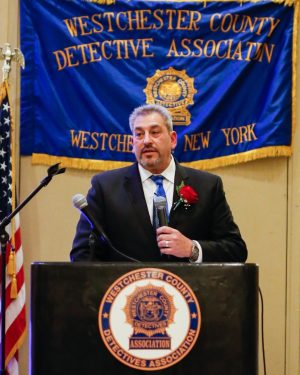
“My wife is an understanding person, but she’s not able to really understand what I’ve gone through because she’s not lived through my experiences,” said Frank, who was shot in the line of duty in Mt. Vernon in 2006. “The things that helped me heal after that incident gave me a unique insight into how people may feel,” he explained, adding that the Foundation is there to offer a shoulder for officers to lean on and provide support for families.
In 2020, a 16-hour course on officer wellness was added as a mandatory part of the curriculum at Westchester’s Police Academy in Valhalla. Members of Westchester B.L.U.E. teach the course that is given at the end of the semester before candidates graduate. This year, for the first time, there was a program offered on the evening before graduation for the families of the candidates. At that course, Westchester B.L.U.E. instructors spelled out what to look for regarding stresses in their family members who are police officers. “They can be part of the support system, they see the change before others see it,” said Frank. Family members get the same information given to police officers about what resources are available to cope with stress related to the job.
Eric Johansen, who used the book “Emotional Survival for Law Enforcement, A Guide for Officers and their Families” by Kevin Gilmartin, for members of the force when he was Peekskill’s chief from 2013 to 2018, said in small departments like Peekskill, officers see everything. “It’s not like New York City, where there’s a division for homicides, missing persons and burglaries. In a department the size of Peekskill, in a 20-year-career, you see all kinds of deaths and injuries.”

Troubling incidents can be over, but they never go away and they can tear away at you, said Johansen, recalling details around the first time he investigated a murder and had to track down the next-of-kin to notify them. “And add to it that Peekskill is a small community – and it becomes very personal,” he said. “It’s not like 30 years ago, when police were looked at as the people who don’t break and felt the pressure to put up a facade. We bleed red, we cry the same tears,” he observed.
Jones and Johansen were colleagues on Peekskill’s tight-knit force for two decades. Recalling Jones: “He was a solid, honest, caring person who could bring a smile to your face. He was a great ambassador for the police department. We’ve lost a real friend. And because of his involvement in the schools, it’s like the kids have lost a teacher,” observed Johansen.
“Jonzee was a great chameleon,” said Chaplain Lindenberg, who explained that oftentimes when officers are experiencing turbulence in their lives they don’t let on the full details of what’s happening with them.
“Here’s what we know to be true about Greg,” said Lindenberg. “He found his happiness, his fulfillment and his sense of purpose at work.” That was echoed by his mother, Joanne Jones, in her Facebook comment to the Herald’s story about the candlelight vigil held in his memory. “He loved the people of Peekskill so much…you were like family to him. He loved working in Peekskill and often told me it was his happy place. …Thank you Peekskill for bringing so much joy and happiness to his life.”
Now the hard work of healing in the wake of his death begins, said Lindenberg.
“We have to go over the top in creating something powerful that will be substantial and live on, something born out of Greg’s death,” said Lindenberg. “It could be a revamped officers gym named for him, it could be a crisis hotline, but it has to be substantial, something positive to honor his legacy.”
In the week since this reporter spoke to Frank for this story, another 21 US police officers took their own lives.





